“A highway, a Walmart, and one of the most exciting Summer Opera Festivals in United States.” It is the line I often use when questioning friends marvel at my travel plans as we fill our modest backpacks with all essentials and head to Indianola, Iowa, to attend another season at Des Moines Metro Opera. While New York, Chicago, and San Francisco do feature prominently in our yearly operatic calendar, Des Moines is slowly beginning to attain similar importance to your friends at newoutpost, due solely for its fine musical profile and exciting programing. Traveling to Indianola is certainly not an experience one would suffer if not for DMMO. Following this fourth visit, we can honestly state with some authority that there’s truly not a lot going on in Indianola. The lodging options are minimal, and if you cannot withstand the offerings of what must be some of the saltiest Mexican food to be found in the Midwest, gas station pizza may end up being the next best thing. One imagines Indianola as a perfect location for a remake of Stephen King’s classic “Children of the Corn” after a casual morning stroll through the deserted town square, and for the standard city dweller it takes a bit to adjust. While a pilgrimage to DMMO may be low on glamour, it makes a special call to the operatic nomad not afraid to rough the conditions to experience some of the greatest opera one could hope for from a regional company in the United States, and this is exactly what DMMO manages to present. The brain child of Dr. Robert L. Larsen, the company has made a name for itself by featuring some of the most exciting singers in the country, and paired them with the most promising young talent via its excellent apprentice artist program. At a time when regional companies are either folding or compromising their programing, this courageous company is anything but thriving, all the while propelling each festival season through bold and exciting repertoire which more established companies would struggle to present. Now in its 43rd season, the company presented another crackling lineup: Puccini’s rare gem La Fanciulla del West, Mozart’s delightful Die Entfuhrung aus dem Serail, and Janacek’s searing Jenufa. Spoiler alert: This may rank as one of the companies most solid seasons to date.
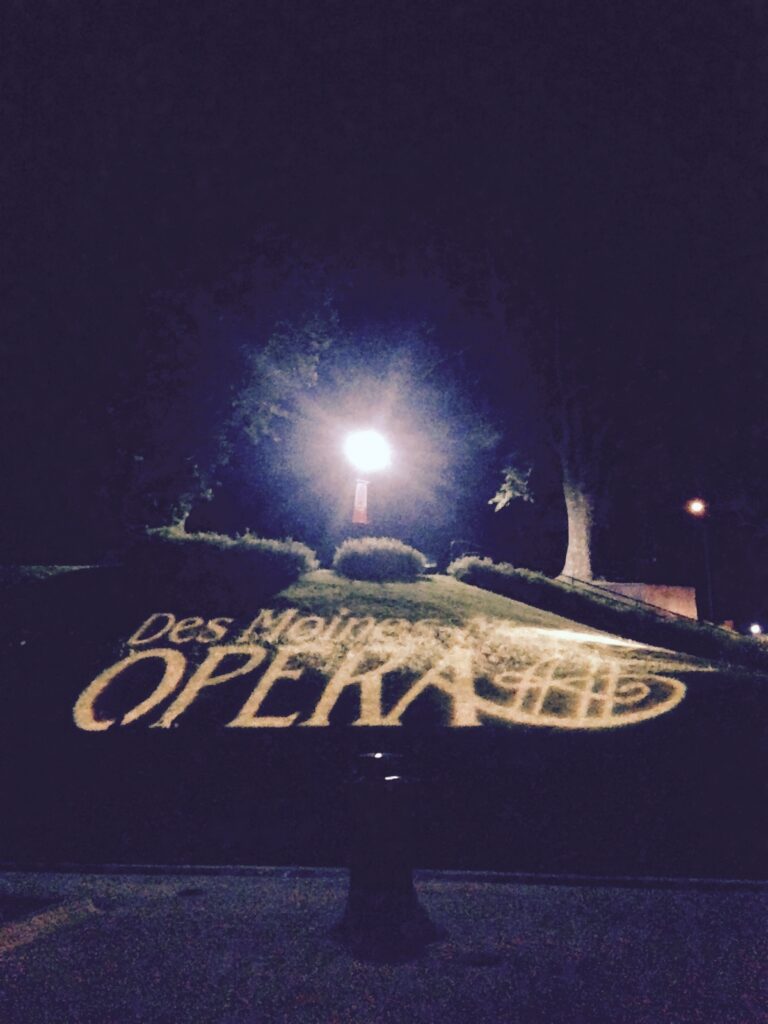
For all of its virtues, the Des Moines Metro Opera has historically been held back by its production values. With this production of Puccini’s La Fanciulla del West, designed by R. Keith Brumley, the company set out to raise the visual bar in a big way. The detailed interior of the Polka Saloon for instance, as well as Minnie’s cozy cabin and the expansive mining camp, provided the perfect atmosphere that allowed the audience to be easily transported to the wild west. As the orchestra blasted the opera’s short prelude under the able baton of maestro David Neely, one was struck at the privilege of enjoying this relatively rare Puccini work in such an intimate auditorium, which paralleled the rock show experience filtered through an Italian aesthetic. The gallop of the horse, the gushing winds, the intense beat of a panicked heart, all projected easily and naturally into the ear with heightened immediacy. Utilizing the odd dimensions of the Blank Performance Arts Center stage, director David Gately managed the large ensemble with a masterful hand, neither devolving into banal sentiment nor mechanical choreography. His principals, too, projected their business with a genuine touch of spontaneity, and all three were heard at their most inspired.
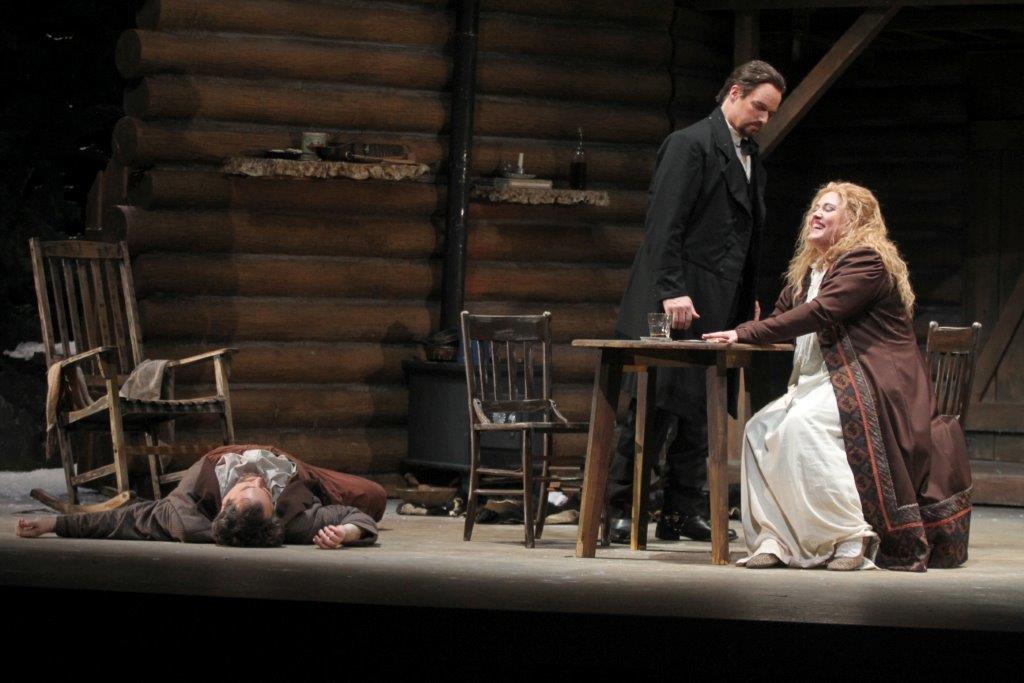
Photo credit Michael Rolands, courtesy of the Des Moines Metro Opera.
La Fanciulla del West is a difficult opera to cast nowadays. The title role requires a voice of Italianate hues and great beauty, yet remain sturdy as it navigates the part’s terrifying tessitura. The dimensions of the vocalism must also be loud, with the second act being particularly demanding and earning the part the nickname of “Puccini’s Brunhilde”. Faced with these daunting challenges, soprano Alexandra Labianco set out to conquer them, and DMMO deserves much praise for finding a singer capable of embracing Minnie’s special proclivities so completely. From her very entrance, Ms. Lobianco made sense of the character’s perplexing personality, bringing forth an endearing and coquettish charm alongside Minnie’s tom boyish qualities. Her warm soprano was tested right away during the first act aria “Laggiu nel Soledad”, revealing a large dramatic voice with an easy steely extension to the top. The timbre is amber colored, more so in line with the great Italian singers who have gained notoriety in this part rather than their American counterparts. Her flirtations with Dick Johnson which closed the act further displayed singing hallmarked by a steady and generous outpour of rich tone, which filled the auditorium with apparent ease. The second act found Ms. Labianco matching the pitfalls of the score note for note, tirelessly riding the orchestra with a voice both capable of ascending the heights and breaking the orchestral sonic wall without loss of tonal beauty. The mythical velvet glove. Later on, during the confrontations with the revealed bandit and the greasy clawed Sheriff, Ms. Lobianco was not afraid to pull the chest resonance upwards to display her discontent, and while stewards of vocal health will wave their finger ” no”, your friends at newoutpost will happily dismiss them. It was most thrilling to hear genuine chest voice within the context of this verismo gem. Perhaps a slight disappointment, she did not overplay her rejoicing at her card trickery, but alas she is still a young singer and surely mindful of the greater matters of good taste. As her development progresses, we hope her cheating will gain greater decadence. As of now, she needs not revert to such treatment in order to succeed so completely in the part as she already has.
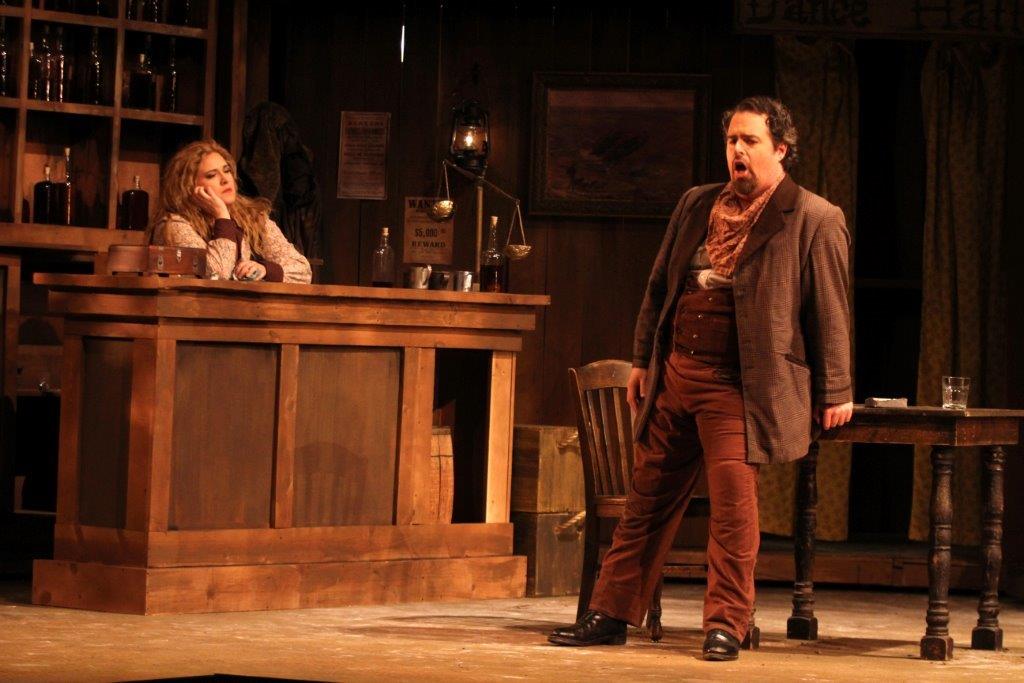
Matching Ms. Lobianco’s radiant Minnie was the Dick Johnson of tenor Jonathan Burton. As we settled into our seats, we recalled fine memories of his Calaf two years ago and prepared to be dazzled by his swaggering tenor. He did not disappoint. The voice remains rich and bronze hued, and was unleashed by this generous artist with exciting abandon. As Dick Johnson (or the bandit Ramerrez for the squeamish,) he was ideally cast. The famed love duet which closes the opera’s first act found him as an irresistible lover, masculine yet tender in the famous section “Quello che tacete” only to unleash into torrentous cascades of sound in his act two confession “No mi difendero, sono un dannato!” A singer famed for his breath control, he seamlessly managed the long lines of the role and swelled his sound against the confines of the hall with little trouble. Like Ms. Lobianco, his art went beyond accomplished singing into the realm of expression, and if his acting chops may have veered towards a more basic approach, he still managed to project an endearing and sweet persona across the footlights. His final solo, the famous “Ch’ella mi creda”, was sung with a lachrymose and desperate tone, the lines “Minnie, della mia vita unico fiore”, as well as the final farewell to the fantastical mining town, touched the heart.
The opera’s bad guy, Sheriff Jack Rance, was sung with impressive panache by baritone Kristopher Irmiter. If his tall and dashing frame loudly questioned Minnie’s unwavering rejection of his constant advances, his singing certainly turned such doubts into veritable disbelief. He is the possessor of a cavernous bass-baritone voice, which carried the day with the richness of his lower register and formidable power. His first significant stretch of music, the short aria “Minnie, dalla mia casa son partito,” showed him to be more than a pretty voice, which revealed the heart of this lonely man in a series of contrasting romantic and blunt phrasings. Naturally he reserved his most forceful vocalism for the confrontation with Minnie in the second act, which evolved into a terrifying battle of wills expressed through a game of poker. This, and the final warblings which marked the end of his part in the third act, revealed the frustrations of this sad and lonely man, who is outwitted for a second and final time.
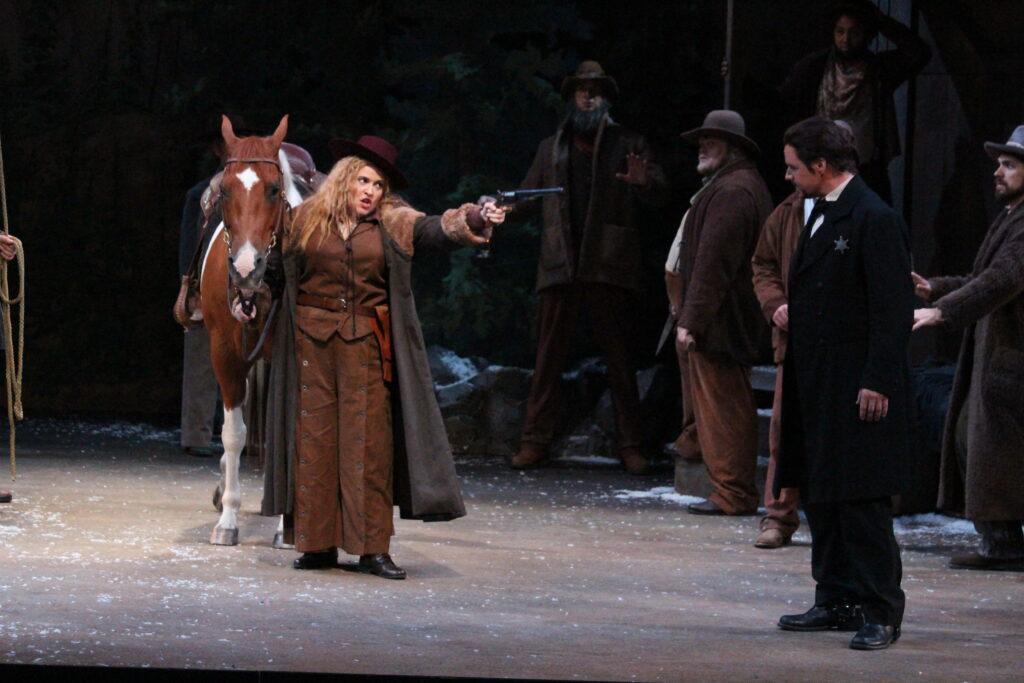
The long list of miners would normally meet the editing scissors in most reviews of La Fanciulla del West, but the motley crew comprised by DMMO were such a brawny vocal bunch that they merit a mention. John Robert Lindsey (Joe), Tyler Alessi (Bello), Lee Steiner (Harry), Steven Sanders (Nick), Zachary Owen (Happy), Evan Ross (Sid), Andrew Potter (Jim Larkens), Joshua Jeremiah (Sonora), George Ross Somerville (Trin), Brandon Hendrickson (Jack Wallace), Cesar Mendez-Silvagnoli (Castro), Christopher Job (Ashby) and Benjamin Schaefer (Pony Express Rider) could all make a fine living touring the nation’s honky tonks performing racy numbers in full western garb. For the matter at hand, they unleashed voices of principal profile rather than those normally reserved for comprimarios, and at times their joined efforts threatened to eclipse the accomplishments of the leading players. Wrapping up this memorable cast, bass Brent Michael Smith and mezzo-soprano Kristen Dininno sang well as the Native Americans Billy Jackrabbit and Wowkle.
Following the complete triumph of La Fanciulla del West, the company followed with a winning performance, though not unqualified success, of Mozart’s Die Die Entfuhrung aus dem Serail. With sets and costumes designed by Jacob A. Climer by way of Utah Opera, the performance was sung in German with the dialogue portions spoken in the vernacular. The size of the auditorium proved this to be a smart choice, allowing the audience to relax into the humorous dialogue without the obligatory need to supertitle it above the stage, an often moot necessity which plagues other companies in larger venues. The production values by Mr. Climer, with its well-manicured artificial turfed spaces, golden framed doorways and exuberant Viennese-styled costumes may have bordered on a light conceptualization, projected a confectioner-like aesthetic that well matched Mozart’s decadent score. The characters indeed resembled ornate and delicious pastry at an expensive café. From the pit, maestro Dean Williamson brought out a fast tempi and verve out of the score, and was seen enjoying himself thoroughly throughout the show. At times the orchestral voice seemed to stray towards its own plane of existence, and while no serious derailment occurred, an occasional disconnect between the pit and the stage was palpable.
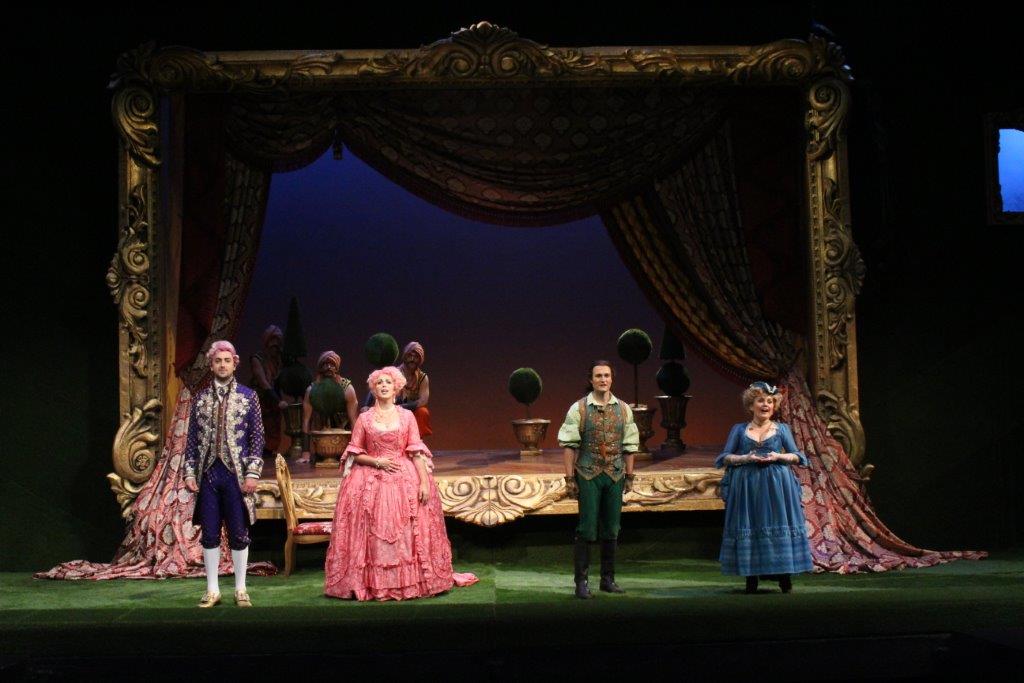
All performances of Die Entfuhrung aus dem Serail live and die by the availability of a soprano capable of negotiating the fiendishly difficult role of Konstanze, and soprano Amanda Woodbury answered the call admirably. Hers is a full lyric soprano, approximately crystalline and of considerable size and charm. Dressed in a splendid pink pale pink gown, she made her first act entrance with the show-stopping aria “Ach, ich liebte, war so glucklich”. The full scope of the aria, which stretches the singer from low F to the D over high C, is a fearsome test facing the leading soprano without preparatory warm up. (The first Konstanze, Caterina Cavalieri, must have been a monster). For her part, Ms. Woodbury took full advantage to display her gifts, and her voice showed remarkable ease at handling the aria’s wide leaps and turns. The hair-raising staccatti were executed with accuracy and satisfying edge, and towards the coda she revealed a perfunctory trill. Through the help of director Chas Rader-Shieber, her stage deportment did not reinvent the wheel of this customarily stoic and plain character, placing the bulk of the character’s emotional turmoil in vocal rather than theatrical terms. This was perfectly represented in the languished delivery of second act aria “Welcher Wechsel herrscht in meiner Seele”, where Ms. Woodbury’s ability to wallow in the long Mozartian line and direct attack made sense of the aria’s disjunct make up as a series of heartbroken sobs and shrieks. She followed with a splendid reading of the opera’s keynote aria, the heroic “Marten aller Arten” which brought the house down.
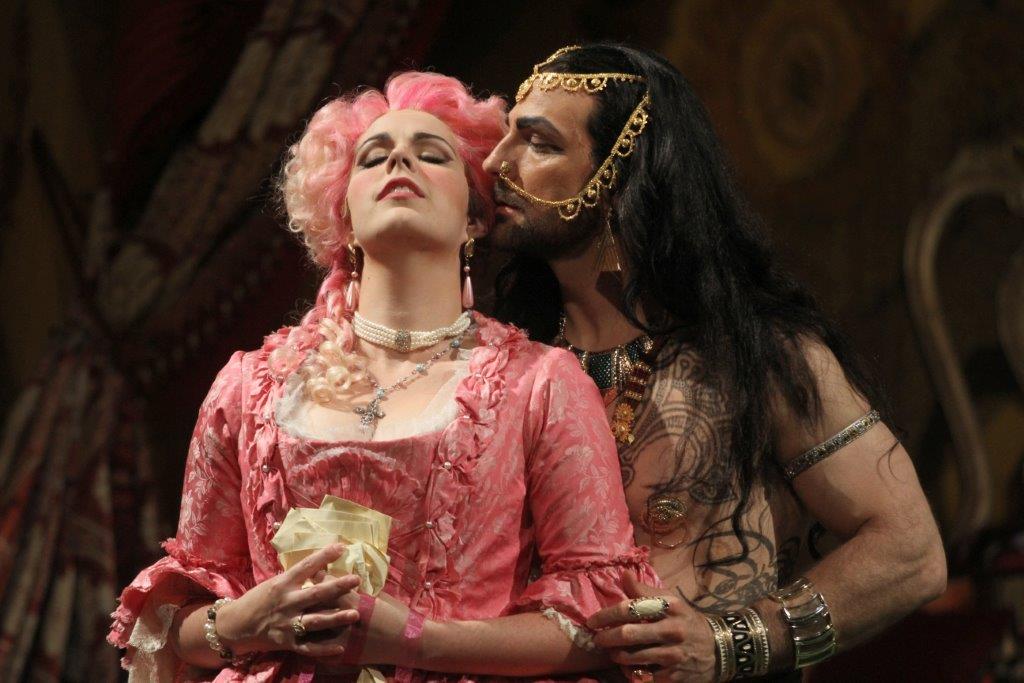
Photo credit Michael Rolands, courtesy of the Des Moines Metro Opera.
Ms. Woodbury’s accomplishments were more than matched by the Belmonte of tenor Ben Bliss who deserved the evening’s top honors. The young and handsome tenor, dressed in a dashing purple numbered peppered by gold embroidery and a blonde wig with decadent pink highlights, looked like a delicious cupcake onstage. He sang beautifully too. He is the possessor of a firm tenore di grazia with fine projection and a meticulous handling of the role’s difficult music. Like Konstanze, Belmonte gets three demanding solos, and the first “Hier sol lich dich den sehen” opens the curtain. In it, Mr. Bliss’ runs were flawlessly executed and the legato was never compromised by even a hint of aspiration. His breath control was also a feature, and one of the extended variations of the line “Und bringe mich ans Ziel” was sustained in one breath for an estimate sixteen seconds, inspiring impromptu applause from the delighted spectators. For the role’s second and third arias, “Kontanze! Dich wiederzusehen!” and “Ich Baue Ganz auf Deine Starke,” he displayed again the same poise in the florid writing while projecting a classic elegance in declamation, never lagging the rhythmic vibrance of his passagework despite his music’s endless repetitions. It was no surprise that, for these performances, the company reopened some customary omissions from the score, and allowed Mr. Bliss to show off his proclivities in the often abbreviated “Wenn der Freude Tranen Fleissen” uncut to the delight of all. Like Ms. Woodbury, his stage business did not extend far past the point of glamorous posing, but with a wig like that one can well afford such luxuries.
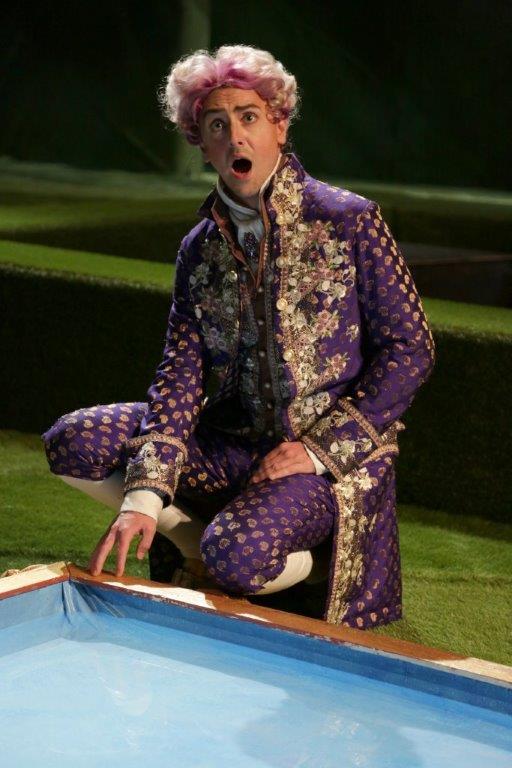
The rest of the cast, though charming, was comprised by singers of a lesser pedigree. The Blonde of soprano Ashley Emerson was piquant, kittenish, and her comic timing inspired a lot of laughter from the audience. Her singing, though accomplished, was not pristine. Hers is a leggiero soprano produced in a wide manner which yielded an unfocused sound. As a side effect, the top notes consistently tightened and threatened to spread. Her tenor boyfriend, the handsome Pedrillo of Jonathan Blalock, sang with a slight tenor marked by inconsistent production throughout its range, at worst veering white under pressure. Bass Matt Boehler was entrusted the eponymous part of Osmin was entrusted to bass Matt Boehler, a role that, when sung well by a luxurious voice, rivals Kontanze’s as a point of interest. His aria “O wie will ich triumphieren” alone runs the gamut of difficulties ever to have been asked of the bass fach. Sadly, Mr. Boehler’s interpretation was held back by an instrument lacking glamorous appeal, and while he sang the music as well as anyone could have asked for, his Osmin remained fixed in the supporting cast category. The spoken role of the Bassa Selim was David Adam Moore, who relied fully on his physical attributes to carry his part to universal approval.
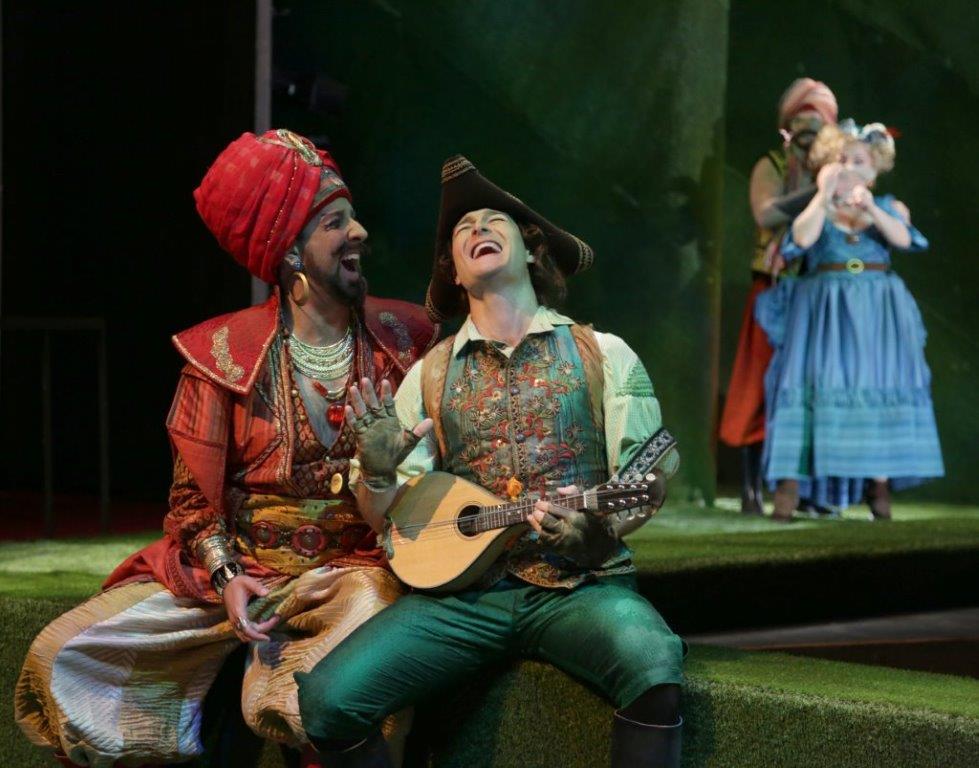
With the success of La Fanciulla del West and the uneven yet enthusiastic reception of Die Entfuhrung aus dem Serail, it was up to Janacek’s Jenufa to settle the score. The final tally would show that while Fanciulla scored as a rock concert, Jenufa took the audience into the musical mosh pit. But it originally did not appear that it would play out that way. When the new season was announced earlier this year, the casting of the title role with soprano Sara Gartland brought some feelings of trepidation amongst your friends at newoutpost. We had, you see, been witness of the young artist’s first outing as Juliette in Gounod’s Romeo et Juliette two years earlier, and found her singing quite at odds with the opera’s musical style and summed up as wholly unmemorable back then. We admit to having dismissed her back then at just one hearing only, and we are so happy to report that, after the experience of Jenufa, we had it completely wrong. Sometime in the last two years, the voice has mellowed into a full lyric soprano of remarkable warmth and beauty, and the core of her method has attained a centrality that is the hallmarks of expressive and healthy singing. Most remarkably, not only did Ms. Gartland revealed herself a different singer, but a completely new artist altogether. Being herself a stunningly beautiful woman, she predictably convinced as a young lady concerned with the banalities of village life with little effort, but it was her transformation as a delirious and desperate young mother in the second act, and her subsequent emotional growth as a woman in the last, that qualified her performance as a remarkable achievement.
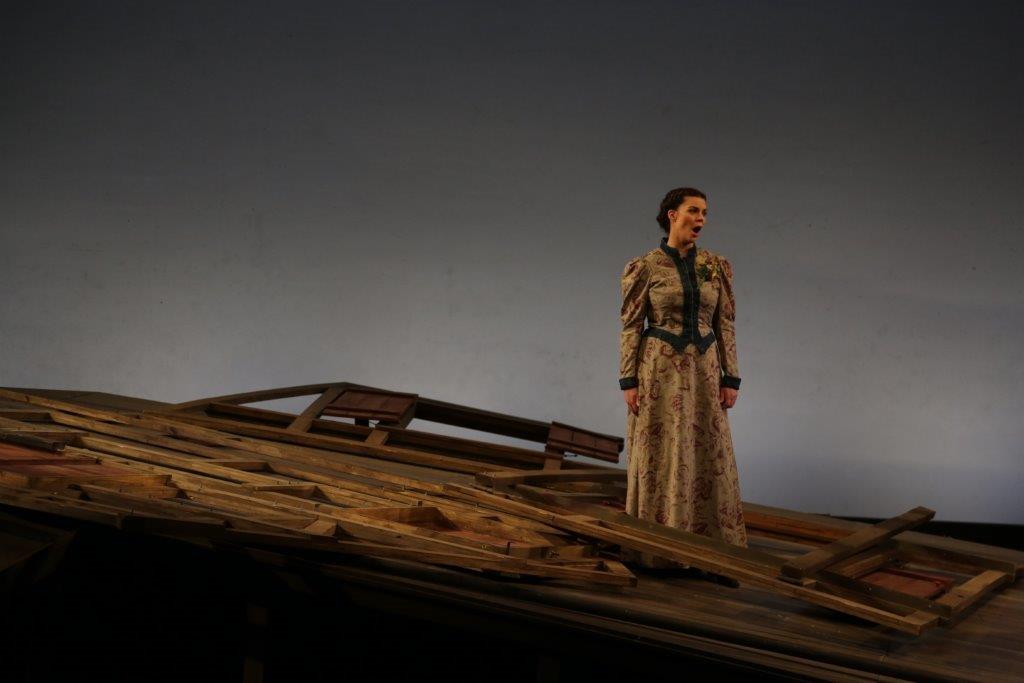
Photo credit Michael Rolands, courtesy of the Des Moines Metro Opera.
Ms. Gartland’s radiant Jenufa shared top billing with the electrifying Kostelnicka of soprano Brenda Harris. A familiar artist to the Des Moines Metro Opera stage and certainly to this blog, Ms. Harris needs no introduction at this point. Credit must go to the casting department at DMMO, who thought to assign the role to the company’s resplendent Elektra from two years earlier. The decision afforded the rare opportunity to hear a Kostelnicka sung by a true dramatic soprano in the peak of her powers, rather than one shouted by a singer past her prime. From her entrance in her short appearance in the first act she gave hint of the authoritative volcanic soprano that she would frankly need in order to make sense of the character’s complexities. All focus, all torment, her singing would dominate the majority of the opera’s second tableau. The moment of debate and the arrival at the chilling decision “Co chvilla…” was a masterful episode of soft, disembodied singing juxtaposed by overwhelming cascades of steel and edge. Her stage deportment was chilling, and the audience witnessed this otherwise sensible woman convince, rather hypnotize herself like her own personal preacher from the pulpit, into a place from where there is no return. Her guilt-ridden outburst at the act’s close stunned the audience, yet amidst all the impressive display of tireless vocalism, she remained expressive and true to the character, reserving her most pleading tones to her dear step daughter, mourning the loss of a past life that is now denied to both of them. Her presence on the stage catapulted an already splendid presentation into one of the great Jenufa performances in the opera’s history.
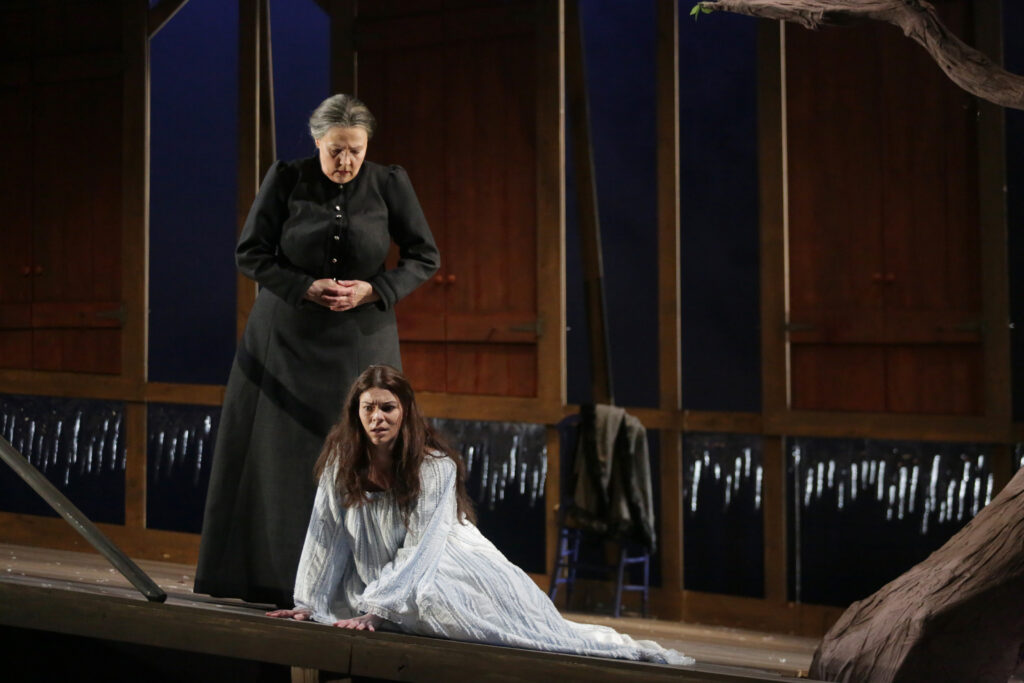
Photo credit Michael Rolands, courtesy of the Des Moines Metro Opera.
The men in this village were equally compelling, starting with the Laca of tenor Richard Cox. The young artist possesses a well-produced, luminous Heldentenor which he molded expertly from tones ranging the contemptuously accusatory to loving and tender in the last act. When the village turned on his bride, he dominated the cacophony of the ensemble with an ocean of sound, and they were smart to listen. Tall and kind faced, he cut a sympathetic figure onstage even when wielding a knife. His brother Steva, the village’s prize child and most eligible bachelor was sung by Joseph Dennis, another dapper young man who could not have been a day past twenty five. His boisterous tenor is a blunter instrument than his brother’s, and stayed appropriately unwavering in its resolve and development throughout the night. Your friends at newoutpost will be sure to follow the development of these exciting young artists.
While the principal artist did their part in contributing to the evening’s success, they had the assistance of an extraordinary production team. The raked stage concept designed by R. Keith Brumley, with its dominant mill wheel in the first and third act as well as the frame of Kostelnicka’s home in the second, served as the ideal setting to facilitate the action. Like in the case of Fanciulla, the production values here were elevated well past efforts seen before, and it is hoped this trend continues. Working in these effective surroundings, director Kristine McIntyre deserves a lot of praise for her seamless transitions between rambunctious public scenes and searing private ones. The one standout moment where she allowed herself conceptual license, the tear down of Kostelnicka’s home, was inspired and provided the emotional closure needed to embark in the final scene. From the pit, the raucous village drama simmered under the dynamic baton of maestro David Neely, who brought remarkable depth and frenetic verve to Janacek’s rich score and propelled the opera to its luminous conclusion.
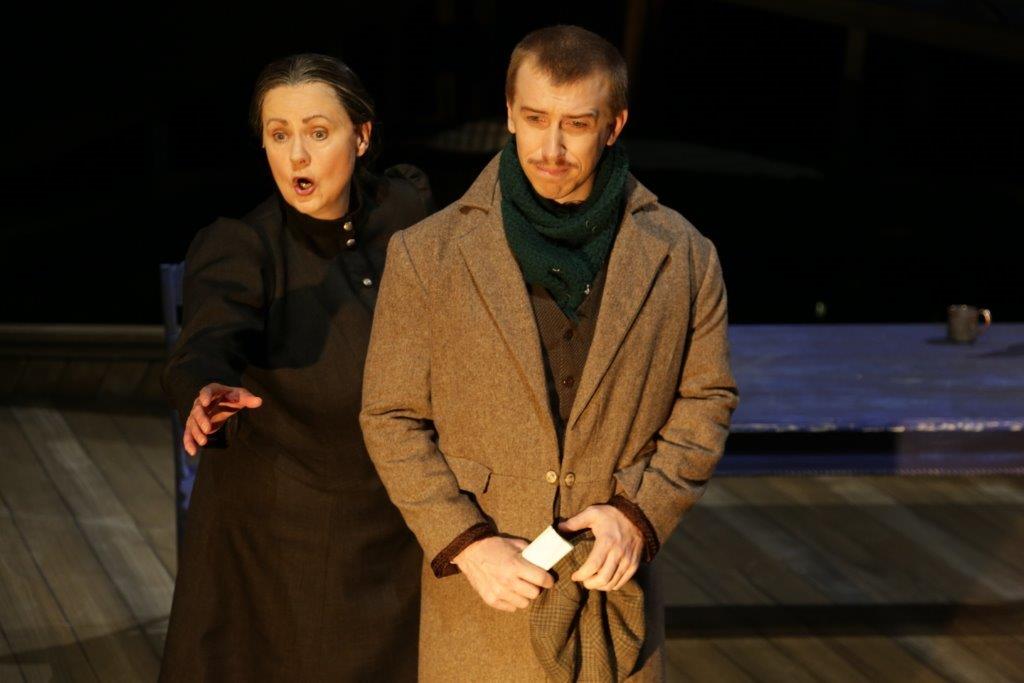
Photo credit Michael Rolands, courtesy of the Des Moines Metro Opera.
The smaller roles were luxuriously cast, featuring the Karolka of Shannon Prickett, a young soprano who is likely to make news in the near future as an exponent of the Verdi repertoire. Making a brief departure from the California desert, bass-baritone Kristopher Irmiter took a strole in our Moravian village as the pompous Mayor. More importantly, the stage was graced American operatic royalty by the presence of mezzo-soprano Joyce Castle, whose vulnerable and touching portrayal elevated the role of grandmother Buryjovka to share in the top of the billing (the joy of hearing her lead the ensemble “Kazdý párek si musí”was worth the price of admission alone). These historic performances of Janacek’s Jenufa were captured on video for future telecast by Iowa Public Television, so please be sure to check your TV listings for an opportunity to experience the magic happening every summer amidst the fields of corn.
For information on the next Des Moines Metro Opera Summer Festival, please visit the company’s website at www.desmoinesmetroopera.org
-Daniel Vasquez